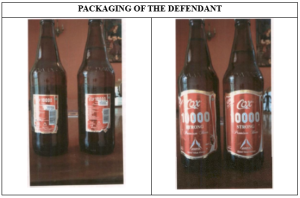 In a suit filed by Modern Breweries Limited, the Delhi High Court considered whether the markings embossed on a bottle are sufficient to create an association between the bottle and the manufacturer such that it prevents third parties from using the said bottle when such practice is prevalent in the beverage industry.
In a suit filed by Modern Breweries Limited, the Delhi High Court considered whether the markings embossed on a bottle are sufficient to create an association between the bottle and the manufacturer such that it prevents third parties from using the said bottle when such practice is prevalent in the beverage industry.
The plaintiff claimed to be a manufacturer of beer and sold them under various marks, all sharing a common factor: the bottles used by the plaintiff were embossed with the DEVANS mark. The defendant, Jagpin Breweries Limited, sold beer under the mark COX 1000 Strong Premium Beer, albeit packaged in the bottles of the plaintiff, prompting a suit. This resulted in an injunction against the defendant, as per the order dated July 22, 2019. The packaging is shown below:

The defendants contended that the bottles they used were sourced from scrap dealers and that there was no intention to use the plaintiff’s bottles specifically. They also argued that the bottles were wrapped and packaged in boxes containing the label of the defendant and, therefore, it was not the bottle that was visible to the consumer at the time of purchase but only the Defendant’s label and stated that the design of the bottle is irrelevant when the purchase is made on the basis of the Defendant’s label. They argued that the claim cannot be sustained because the plaintiff’s bottles are not distinctive such that they are identifiable when placed alongside other bottles in restaurants or bars.
The court noted the established legal principle that bars the reuse of bottles branded by a third party. It was held that utilising bottles with the ‘DEVANS’ name embossed on them may give consumers the impression that the ‘COX’ beer sold by the defendant originates from the plaintiff’s line of products.
The Court held that usage of bottles bearing DEVANS by the Defendant would amount to infringement under Section 29 of the Trade Marks Act, 1999, since it creates the impression that the defendant’s products originate from the plaintiff’s line of products. This judgment grants clarity on the sale of beverages manufactured by third parties packaged in bottles manufactured by others.
Authors: Manisha Singh and Tushitta Murali
First Published By: Lexology Here



